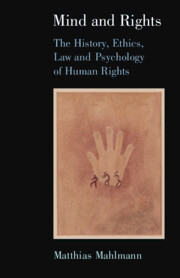Acknowledgments
The cover image is a reproduction of striking Paleolithic rock art in northern Africa, Gilf Kebir, painted by Elisabeth Pauli in 1933 during an anthropological expedition to that region. It was exhibited together with other such documents of prehistoric rock art at the MoMA in New York in 1937. The picture documents the common universal heritage of human beings, here displayed in a cave in northern Africa by people whose descendants were regarded as primitive brutes by European colonizers. It shows the rich, equal creative endowment of human beings that has been the basis for the cultural achievements of our species throughout the ages and across the globe, achievements that ultimately also include – which is the point of this book – the ethics and law of human rights.
Many people have helped to develop the argument of the book. I would like to thank John Mikhail for his comments on the manuscript and for the privilege of decades of intense discussions about the foundations of ethical thinking and the law. As doctoral students, we were both inspired by Noam Chomsky’s work on the theory of the human mind and its deep implications for our understanding of what kind of creatures we are. I am very grateful for the input Noam Chomsky has provided about the topic this book now addresses. I owe a substantial debt to András Sajó for his critical input on the final manuscript and many (increasingly alarmed) discussions about rights and constitutionalism and the enemies both are facing. I also thank Christopher McCrudden and Mordechai Kremnitzer for very helpful critical feedback on the manuscript and the ongoing dialogue about a liberating and egalitarian project of human rights. I have profited very much from Eyal Zamir’s criticism and suggestions on an initial paper and the final manuscript.
I was fortunate to profit from comments on talks and publications and from discussions on the topic, the theses of this inquiry and its wider background in ethics and law at various stages of the project. I thank Tilmann Altwicker, Shreya Atrey, Susanne Baer, Samantha Besson, Giovanni Biaggini, Andrea Büchler, Oliver Diggelmann, Catarina Donati, Marcus Düwell, Christoph Engel, Rivka Feldhay, Thomas Gächter, Alain Griffel, Klaus Günther, Michael Hagner, Lutz Jäncke, Nadja El Kassar, Helen Keller, Tarunabh Khaitan, Anne Kühler, Philip Kunig, Christos Kypraios, George Letsas, Stefan Magen, Frank Meyer, Daniel Moeckli, Stephen Morse, Jörg-Paul Müller, Catherine O’Regan, Anne Peters, Orin Percus, Hubert Rottleuthner, Peter Schaber, M. N. S. Sellers, John Tasioulas, Ian Tattersall, Arun Thiruvengadam, Renata Uitz and Lutz Wingert for critically engaging with me on these questions in different forms. I am particularly grateful for the thoughts about the human rights project that Regina Kiener and the late Andreas Auer generously shared with me.
I have had the privilege to learn much about interdisciplinary perspectives on the foundations of law from my colleagues in the Fachgruppe Grundlagen at the Faculty of Law: José Louis Alonso, Ulrike Babusiaux, Wolfgang Ernst, Christoph Graber, Johannes Liebrecht, Elisabetta Fiocchi Malaspina, Marcel Senn and Andreas Thier.
I profited significantly from the detailed comments of the anonymous reviewers of the project.
I am particularly thankful to Margaret Hiley, who not only shouldered the task of language editing most professionally and with outstanding skill but also engaged substantially with the content of the text, which helped to considerably improve the clarity of the argument.
The members of my research group and affiliates of the law and philosophy discussion group in Zurich have contributed in many ways to the work on and arguments in the book. I am therefore indebted to Corina Diem, Peter Gailhofer, Levin Güver, Matthias Hächler, Frederik von Harbou, Jón Laxdal, Nicole Nickerson, Pascal Meier, Nebojsa Mijatovic, Angela Müller, Ilona Paulke, Lena Portmann, Nils Reimann, Stefano Statunato, Julia Stern, Hanna Stoll, Youlo Wujohktsang and Nadja Zink.
Corina Diem, Levin Güver, Jón Laxdal, Angelina Manhart, Nebojsa Mijatovic, Nicole Nickerson, and Stefano Statunato patiently assisted me during the final editorial phase of the project.
I had the opportunity to present and discuss the theses of the book during a research stay at the Bonavero Institute of Human Rights, University of Oxford, as a fellow at Mansfield College in 2021/22. I would like to thank Catherine O’Regan for her hospitality and Christos Kypraios and Sarah Norman for their support. I am grateful for the substantial input I received.
I was invited to teach a course on “Mind and Rights” at the University of Pennsylvania School of Law as a Bok Visiting International Professor. I am thankful for this invitation and the opportunity for scientific exchange it offered, in particular to Stephen Morse, who for several years has been teaching a law and neuroscience seminar with me in Zurich.
Special thanks to Matt Gallaway for his interest in the project and persistent, patient support throughout the writing process. Jadyn Fauconier-Herry and Joshua Penney offered much-appreciated help. John Stewart Marr made copy editing a smooth and sometimes funny exercise.
Georgia Strati had a profound impact on the genesis of the book. Moreover, her philological expertise was of great importance for the work on ancient sources.
The book incorporates some materials from Matthias Mahlmann, “Mind and Rights: Neuroscience, Philosophy, and the Foundations of Justice,” in Law, Reason, and Emotion, edited by M. N. S. Sellers, 80–137 (Cambridge: Cambridge University Press, 2017), included by kind permission.
I would like to thank the Frobenius-Institut für Kulturanthropologische Forschung, the Goethe-Universität Frankfurt and Dr. Richard Kuba for the permission to use the cover image.
Parts of the poem Santorini by Giorgos Seferis are reproduced with Anna Lontou’s kind permission.
The open access publication of this book has been published with the generous support of the Swiss National Science Foundation.

